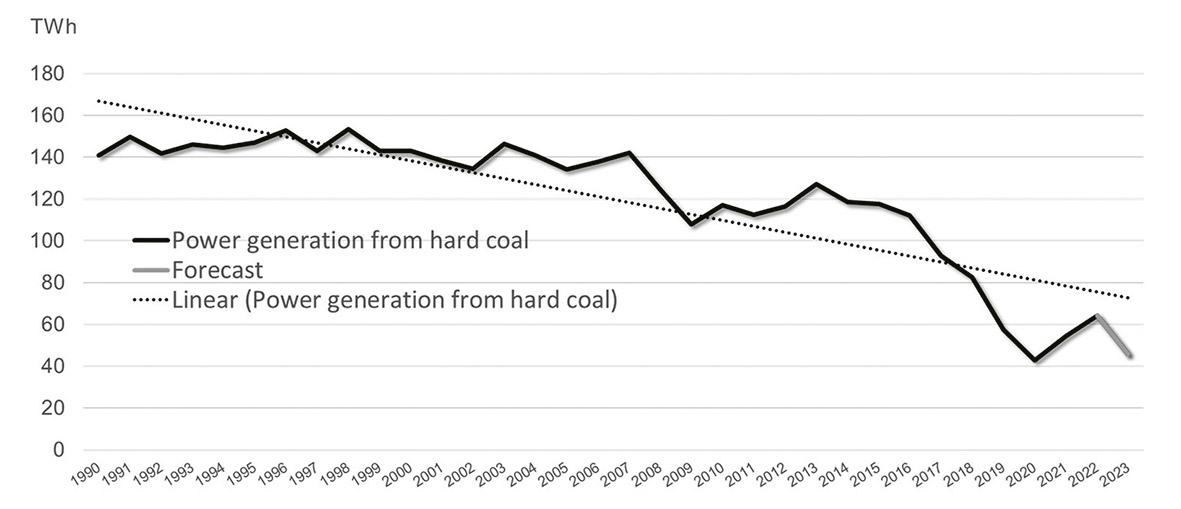
Fig. 1. Power generation from hard coal in Germany. // Bild 1. Stromerzeugung aus Steinkohle in Deutschland. Source/Quelle: AGEB/BDEW/EEFA/VDKi
The year 2023 demanded a lot from the German economy and the energy sector. It was not a good year! Economic output and industrial production fell. Germany hit the headlines as the “sick man of Europe”. With the shutdown of the last nuclear power plants, Germany went from being a net exporter to a net importer of electricity for the first time since 2002. As a result, the scarce supply of electricity combined with the highest taxes, levies and surcharges in Europe after Denmark led to further increases in energy prices. Added to this were the wars in Ukraine and the Middle East as well as the terrorist attacks in the Red Sea.
“All of these developments have a direct impact on our energy markets,” says Alexander Bethe, Chairman of the Association of Coal Importers (VDKi). “Security of supply in the electricity sector should be our top priority.” The VDKi is therefore calling on the German government to extend the Act on the Provision of Substitute Power Plants (EKBG) and to increase the supply on the German electricity market.
In the opinion of the VDKi, it would be grossly negligent not to fall back on hard coal as the guardian angel of the energy supply in the coming winters (Figure 1). In view of the tight budget, it is highly unlikely that enough gas-fired power plants can be built in the coming years to compensate for the dark doldrums. Bethe: “There is no alternative to backing up hard coal-fired power plants for Germany’s energy security. Without hard coal-fired power plants, there is no security of supply”.
One advantage of hard coal-fired power plants in market operation is their great flexibility. They only produce when they are needed. In the winter of 2022/23, they contributed to security of supply and a reduction in gas consumption. In spring and summer 2023, however, when more renewable energies were available, they hardly ran at all. Another advantage of hard coal is that the raw material comes from different countries and the supply routes are much more resilient than for gas. The import of more than 50 % Russian coal, e. g., for the German market was completely replaced within a few months. Even the blocking of individual shipping routes could be circumvented relatively easily, as hard coal is available globally. The global market for bulk carriers is extremely efficient. “The supply of imported coal is rock solid and stable. Its availability in the Belgian/Dutch seaports and on the German coast was and is guaranteed at all times,” says Bethe.
However, skilled labour and special parts are in short supply. Power plants need planning security. This also applies to logistics. Without lead times and planning horizons, the required quantities cannot be transported. “A lack of planning security ultimately leads to a lack of supply security,” continues Bethe. “This is another reason why the Substitute Power Plant Provision Act (EKBG) must be extended.”
Furthermore, two new reports show that the carbon footprint of liquefied natural gas (LNG) is significantly worse than that of imported hard coal. Hard coal-fired power plants have a better carbon footprint than LNG-fuelled power plants, according to a recent study by the US University of Cornell and a report by Prof. Franz-Josef Wodopia from the TH Georg Agricola University (THGA) in Bochum/Germany.
The VDKi also welcomes the initiative of the Federal Ministry for Economic Affairs and Climate Action (BMWK) to reduce greenhouse gas emissions using CCS and CCU technologies: CCS and CCU as building blocks for a climate-neutral and competitive industry – this technology should also be made available as an option to the power industry. (VDKi/Si.)
